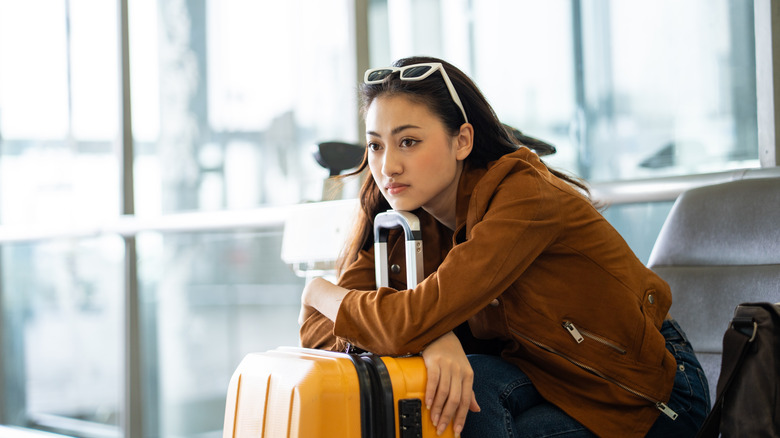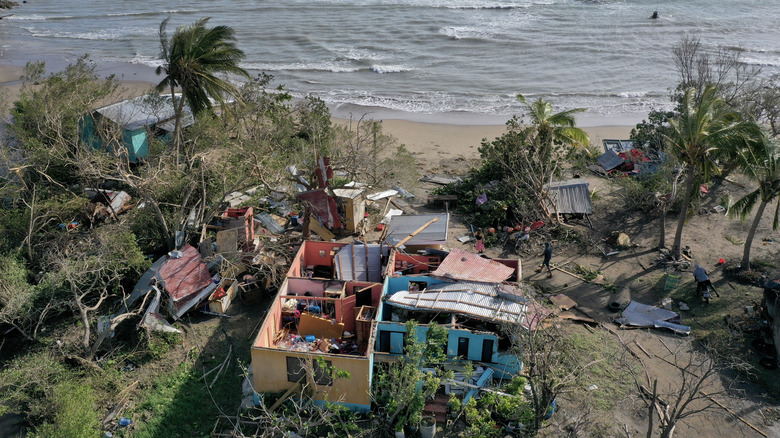Hurricane Melissa Shows Why Travel Insurance Is A Must For Caribbean Trips
One of the worst storms in Jamaica's history hit the island this week in the form of Hurricane Melissa, a Caribbean superstorm superceding even Katrina's intensity, and, according to experts, "the strongest storm on the planet this year." Hurricane Category 5 Melissa, upon landing in Jamaica on October 28, unleashed catastrophic damage — flooding homes, downing power lines, wiping out roads, and destroying entire neighborhoods — leaving a rising death toll. As of October 30, at least 30 were confirmed dead across the region, as Melissa scourged Cuba and the Bahamas, barreling toward Bermuda. Nearly 72% of Jamaica's population is without power. The devastation is heartbreaking for residents, particularly since the island was still reeling from Hurricane Beryl in 2024. And for many travelers, Hurricane Melissa turned dream vacations into logistical nightmares — an all-too-common reality during the Caribbean's hurricane season, the riskiest time to visit.
Jamaica, beloved by travelers for its gorgeous beaches, small seaside towns, and all-inclusive, luxury resorts, had about 25,000 international visitors when Melissa struck. All have reportedly been accounted for, though many remain stranded as they wait for flights to resume. Ahead of the storm, Jamaica closed its two main international airports — Norman Manley International Airport in Kingston and Sangster International Airport in Montego Bay – though Kingston reopened for relief flights on Wednesday and some commercial flights on Thursday. Jamaican cruise ports are currently closed to both passengers and shipping; cruise lines from Carnival to Margaritaville have rerouted itineraries.
Visitors face unexpected costs for extended stays, rebooked flights, or damaged property. Those who purchased comprehensive travel insurance before the storm was named are now discovering the value of that decision, while those who did not — or purchased it too late — are finding out the hard way that it may have been worth it.
The controversy around travel insurance
Travelers have been urged to stay put to avoid flooding, downed power lines, and other hazards. Meanwhile, they're discussing what, if any, compensation they'll be able to access. In a thread following a now-deleted Reddit post titled, "Worst Hurricane in Jamaica's History — and NO REFUNDS?!??!" one user wrote, "Mind boggling to spend so much on a trip in the Caribbean during hurricane season and not getting insurance." Another pointed out that third-party policies can cover things like lost luggage, medevac flights, and disruptions, if purchased before payment. "The hurricane isn't your fault ... but it isn't theirs either," they noted.
Though coverage varies by provider, travel insurance typically protects against unexpected cancellations due to severe weather, illness, or emergencies; delayed or lost baggage; and emergency evacuation and medical care. The optional CFAR (Cancel for Any Reason) upgrade offers even greater flexibility — yet won't cover the total cost. Most insurers exclude losses from "known events," meaning coverage won't apply if purchased after a storm is named. If an airline or tour operator cancels your trip, they typically issue a refund, but you're out of pocket for extra hotel stays and meals. Those who cancel without insurance may be eligible for reimbursement under a "disinclination to travel" clause — so always read the fine print!
Interestingly, in 2024, after Hurricane Beryl, Jamaica took out a $150 million catastrophe bond — essentially an insurance policy on itself. The current storm, Hurricane Melissa, appears to have triggered every condition for a payout, and experts believe funds could reach Jamaica quickly, providing much-needed support to local recovery efforts. "Jamaica's strategy is, in my view, one of the most comprehensive of any country globally right now," said Conor Meenan, a U.K.-based risk-financing adviser at the Centre for Disaster Protection.

